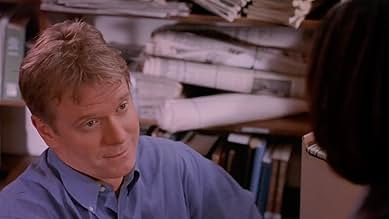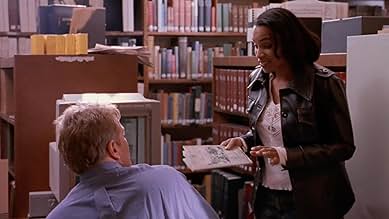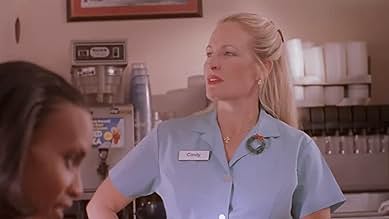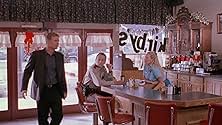A life-sized Nativity scene leads a man to learn about his past and lost family.A life-sized Nativity scene leads a man to learn about his past and lost family.A life-sized Nativity scene leads a man to learn about his past and lost family.
- Directors
- Writers
- Stars
Tree Browning
- Mom
- (as Theresa Browning)
Wilma Jeanne Cummins
- Venna
- (as Wilma Cummins)
Mary Donnelly Haskell
- Cindy
- (as Mary Donnelly-Haskell)
Tom Lester
- Radio Announcer
- (voice)
- Directors
- Writers
- All cast & crew
- Production, box office & more at IMDbPro
Featured reviews
This film has lots of themes in it. Most of all it has deal with "finding family", "What is family", and what secrets are worth keeping. Most of all what price people pay for keeping those secrets.
This is one of those rare films that you can not multi-task while watching. You need to pay attention to the details otherwise you can easily lose track of people's names and motivations.
In this film Bill Ewing's holiday film Christmas Child concerns Jack (William R. Moses), a reporter who has been having a difficult time getting much joy out of his life. Both his wife (Megan Follows) and his job fail to revive his spirits. While he is working on a story in Dallas, TX, he comes across a photograph that gets his attention. The photograph leads him to Clearwater, TX, where he learns about the town's ornate nativity scene and confronts his past and maybe can lead him to a happier future.
This film is well made. Its heart is in the right place. I am glad that the makers of this film did not portray "Small Town" USA as bunch of hicks.
If you like stories without Hobbits & Super Heroes then watch this. Trust me it is much better than most of those films.
This is a nice films for adults. Kids will be bored.
This is one of those rare films that you can not multi-task while watching. You need to pay attention to the details otherwise you can easily lose track of people's names and motivations.
In this film Bill Ewing's holiday film Christmas Child concerns Jack (William R. Moses), a reporter who has been having a difficult time getting much joy out of his life. Both his wife (Megan Follows) and his job fail to revive his spirits. While he is working on a story in Dallas, TX, he comes across a photograph that gets his attention. The photograph leads him to Clearwater, TX, where he learns about the town's ornate nativity scene and confronts his past and maybe can lead him to a happier future.
This film is well made. Its heart is in the right place. I am glad that the makers of this film did not portray "Small Town" USA as bunch of hicks.
If you like stories without Hobbits & Super Heroes then watch this. Trust me it is much better than most of those films.
This is a nice films for adults. Kids will be bored.
"Christmas Child" doesn't fit in the usual uplifting and romantic type of stories that are so popular over the Christmas holidays. But this film is quite good. It does have a sub-theme that looks at the origin and real meaning of Christmas. And that is seen through a main plot of finding family and discovery of one's roots. While it may not appeal to some people, I think this film will be very meaningful to those who have been adopted, or who have adopted children themselves or had to give up a child for adoption. That would be several million in North America alone, and as many in Europe and perhaps other areas. Most people grow up with their biological mom, or dad, or both. So, they don't ask where they came from or who their parents were. But, for those of us who have been adopted, it's quite different. It's a natural thing to wonder about who a mom or dad or parents were and to want to find out something about them.
This film treats this subject in a very good way. I rate it highly for that reason. And it would rate still higher but for one main character who is not essential to the story, and for some aspects of the script and film that are distractions, or that don't fit well or make much sense.
I won't give the story away, but will note these few points and shortcomings. William Moses gives a mostly superb portrayal of Jack Davenport. But, in the opening scenes, it's not quite clear why his relationship seems so cold with his wife, Meg, played by Megan Follows. One can't help thinking that love has gone out of their lives - that he no longer loves Meg. Jack has been grieving his adopted father's death nine months earlier, Now he is curious about his blood parents when he finds a photo and keepsake items in his dad's safety deposit box. But why should this make him is so cool toward his wife? Not once when they talk on the phone and he calls her from Texas, does he say that he loves her. Was an intentional aspect of the film - to have viewers think there was no longer love there and their marriage was falling apart? It's a further distraction that could easily have been eliminated just by Jack telling Meg at the end of one or two phone calls, that he loves her. That would further drive home the notion that something else is bothering Jack deeply.
Finally, I could see no purposes whatsoever in the character of the sheriff, Jimmy-James, played by Muse Watson. If anything, his inclusion and Jack's interplay with him act like red herrings to the story. They have nothing to do with the plot. Instead, this gives a negative drift to the film. Was it intended to portray a southern red-neck sheriff who resents a city-sicker coming to town? Especially one from up North? Because that's sure what it looks like. Now, the sheriff wasn't crass or crude or bombastic in anyway. He was rather calm and cool. But he had nothing better to do in the town than watch, pursue and nitpick with a pleasant journalist from out of town? There is one hint that Jimmy-James's harassing streak comes from jealousy. When Jack first goes into Kirby's Café to look over the pictures taken by the late Rev. Krause, and the waitress, Cindy, pays more attention to him than to Jimmy-James, the sheriff flashes an ornery look on his face.
But, again, all the incidents with the sheriff and Jack after that don't fit the story overall, and they detract more than they help the story. If anything, they paint Jack as something of a dummy. One doesn't challenge a law officer who's doing his job, however picayunish it may seem. And, the sheriff's hounding Jack makes him to look like a red-neck with nothing better to do. Everything of substance about this story could be told and more meaningfully, with the sheriff's character eliminated entirely - or changed to eliminate the disputes.
The movie was filmed in Okmulgee, Oklahoma, as the fictional town of Clearwater, Texas. The street scenes clearly show a small town of the range of 10,000 or so population. Such towns usually have a few churches, not just one community church. There is a line by Jack late in the film that refers to other churches in the town. That makes it a little odd that all the people that Jack meets in this story would be members of or attend this one church. And, for the annual Christmas Eve program at the nearly life-sized hand carved nativity scene, the gathering doesn't seem very large if the nativity scene is the pride of the community. One other small goof in the script is when Jack is invited to the celebration at Stafford's barn. He doesn't ask for directions, and the person doesn't tell him how to find it
This movie is based on a short story by Max Lucado, "The Christmas Cross." He revised it in 2003 and changed the title to "The Christmas Child: A Story of Coming Home." The film has a very good ending that fits perfectly with the themes of family and Christmas. Here are a couple of lines from the film
Dan, the helper in the church, "Christmas Eve. Special service. You plannin' on comin?" Jack Davenport, "I'll think about it." Dan, "It's a good thing God didn't think about it. He did it. He came. Now, that's somethin' to think about."
Judge, "I figure he worked 10 years carving this nativity scene."
This film treats this subject in a very good way. I rate it highly for that reason. And it would rate still higher but for one main character who is not essential to the story, and for some aspects of the script and film that are distractions, or that don't fit well or make much sense.
I won't give the story away, but will note these few points and shortcomings. William Moses gives a mostly superb portrayal of Jack Davenport. But, in the opening scenes, it's not quite clear why his relationship seems so cold with his wife, Meg, played by Megan Follows. One can't help thinking that love has gone out of their lives - that he no longer loves Meg. Jack has been grieving his adopted father's death nine months earlier, Now he is curious about his blood parents when he finds a photo and keepsake items in his dad's safety deposit box. But why should this make him is so cool toward his wife? Not once when they talk on the phone and he calls her from Texas, does he say that he loves her. Was an intentional aspect of the film - to have viewers think there was no longer love there and their marriage was falling apart? It's a further distraction that could easily have been eliminated just by Jack telling Meg at the end of one or two phone calls, that he loves her. That would further drive home the notion that something else is bothering Jack deeply.
Finally, I could see no purposes whatsoever in the character of the sheriff, Jimmy-James, played by Muse Watson. If anything, his inclusion and Jack's interplay with him act like red herrings to the story. They have nothing to do with the plot. Instead, this gives a negative drift to the film. Was it intended to portray a southern red-neck sheriff who resents a city-sicker coming to town? Especially one from up North? Because that's sure what it looks like. Now, the sheriff wasn't crass or crude or bombastic in anyway. He was rather calm and cool. But he had nothing better to do in the town than watch, pursue and nitpick with a pleasant journalist from out of town? There is one hint that Jimmy-James's harassing streak comes from jealousy. When Jack first goes into Kirby's Café to look over the pictures taken by the late Rev. Krause, and the waitress, Cindy, pays more attention to him than to Jimmy-James, the sheriff flashes an ornery look on his face.
But, again, all the incidents with the sheriff and Jack after that don't fit the story overall, and they detract more than they help the story. If anything, they paint Jack as something of a dummy. One doesn't challenge a law officer who's doing his job, however picayunish it may seem. And, the sheriff's hounding Jack makes him to look like a red-neck with nothing better to do. Everything of substance about this story could be told and more meaningfully, with the sheriff's character eliminated entirely - or changed to eliminate the disputes.
The movie was filmed in Okmulgee, Oklahoma, as the fictional town of Clearwater, Texas. The street scenes clearly show a small town of the range of 10,000 or so population. Such towns usually have a few churches, not just one community church. There is a line by Jack late in the film that refers to other churches in the town. That makes it a little odd that all the people that Jack meets in this story would be members of or attend this one church. And, for the annual Christmas Eve program at the nearly life-sized hand carved nativity scene, the gathering doesn't seem very large if the nativity scene is the pride of the community. One other small goof in the script is when Jack is invited to the celebration at Stafford's barn. He doesn't ask for directions, and the person doesn't tell him how to find it
This movie is based on a short story by Max Lucado, "The Christmas Cross." He revised it in 2003 and changed the title to "The Christmas Child: A Story of Coming Home." The film has a very good ending that fits perfectly with the themes of family and Christmas. Here are a couple of lines from the film
Dan, the helper in the church, "Christmas Eve. Special service. You plannin' on comin?" Jack Davenport, "I'll think about it." Dan, "It's a good thing God didn't think about it. He did it. He came. Now, that's somethin' to think about."
Judge, "I figure he worked 10 years carving this nativity scene."
I love this story of redemption. Not a flashy Hollywood work o fiction but instead a heart warming story of forgiveness.
This might have been a good movie, but it just did not feel complete. It didn't feel like all the loose ends were resolved. There seemed no answer to the question of the main character's father. What happened to him? Why did the main character, the reporter, not try to find out about him? After finding out about his birth mother he seemed to have no interest in finding out about his birth father. The movie did not indicate what happened to the birth father. What was the town sheriff so out to get him? There seemed no clear explanation for that other than he didn't want him snooping around. It just left too many unanswered questions.
William R. Moses really out-did himself this time. He brings life and depth to all his parts. He's a truly believable artist. Great Smile and wonderful personality. I was pleased that he chose to do a Max Lucado story, One of my favorite stars in a movie by one of my favorite authors. What a great pair. I hope they do more stories together in the future. William brings quality to any movie or show he plays in. He has a great attitude and gives powerful performances. He is so versatile in his acting. I have seen him play heroes and villains, all done with great talent and charm. I adore William R. Moses and hope one day I would be so fortunate to meet him.
Did you know
- GoofsThe radio announcer refers to the local area as West Texas. However, he also references a listener in Deaf Smith County, which is located in the Panhandle. No one in Texas refers to the Panhandle as West Texas. They are two completely separate regions.
- SoundtracksJingle Bells
Written by James Pierpont
Produced and Arranged by Scott Matthews
Performed by Janet Rutland
All Rights Reserved. Used by Permission.
Details
- Release date
- Country of origin
- Language
- Also known as
- Рождественский ребенок
- Filming locations
- Production company
- See more company credits at IMDbPro
- Runtime
- 1h 36m(96 min)
- Color
- Aspect ratio
- 1.85 : 1
Contribute to this page
Suggest an edit or add missing content































